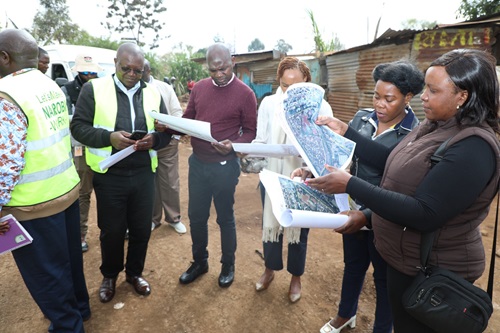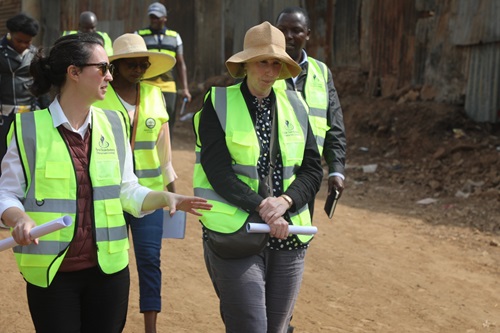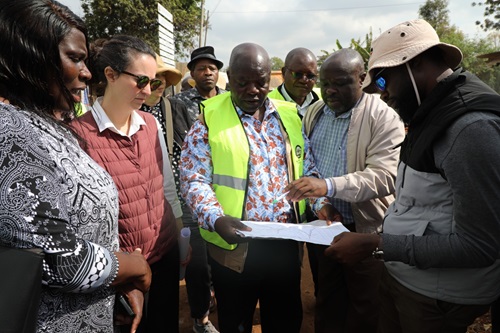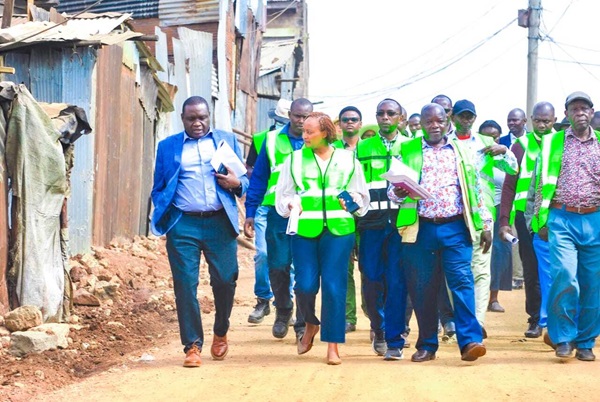Nairobi:25th September,2024
Yesterday, a team from the World Bank, visited Kahawa Soweto informal Settlement scheme to inspect progress of works under the Kenya Informal Settlement Improvement Project (KISIP 2). Led by Task Team Leader (TTL) Ms. Beatriz Eraso Puig, the team got firsthand information from community members on the project status. The team was on a mission to establish the status of the projects since inception, challenges encountered and the strategies employed to address any bottlenecks.
Accompanying the World bank team was the National Project Coordination Team (NPCT) lead by the KISIP 2 National project coordinator Mr. George Arwa, the County Project Coordination Team (CPCT) led by the County Coordinator Ms. Jecinta Charles, members of Settlement Executive and Grievance Redress Committees, the Contractor and the project Consultant.
 Said Ms. Eraso “As a team we are very impressed with the progress of works which ties with the reports we have been receiving as it portrays the team’s commitment to improving the lives and livelihoods of the residents within the earmarked settlement schemes.” We are convinced that the community has full ownership of the project and we commend all the teams led by the National and Nairobi County Governments.
Said Ms. Eraso “As a team we are very impressed with the progress of works which ties with the reports we have been receiving as it portrays the team’s commitment to improving the lives and livelihoods of the residents within the earmarked settlement schemes.” We are convinced that the community has full ownership of the project and we commend all the teams led by the National and Nairobi County Governments.
Addressing members at the Kahawa Soweto Social hall, Nairobi City County’s project coordinator Ms. Jecinta Charles alluded that Kahawa Soweto was one of the settlements that had encountered very minimal hitches during implementation, a situation that catalyzed the progress of works. She attributed this to the support from H.E. Governor Sakaja, Nairobi County Government and the leadership in Housing and Urban Renewal Sub-sector. MS. Charles highlighted that since the ground breaking ceremony which was graced by H.E the Governor, the community’s hope of living in dignified spaces was renewed which further strengthened the working relationship within the community.
In his manifesto, Governor Sakaja committed to establish better housing policies which are citizen focused; conduct participatory review of the urban renewal programme and ensure that project affected persons are never left on their own in the cold but are guaranteed homeownership.
The Governor also committed to address land ownership and tenancy in Nairobi and a week ago, the County boss distributed over 1,000 title deeds to individual owners. This marked a major milestone in a quest to unlock land ownership issues in the Capital city. The County Government of Nairobi has for the past two years issued over 7,000 title deeds to individuals and public institutions across the city.
In his remarks the National Project Coordinator Mr. George Arwa, stated that the National Government was considering the idea of social housing in the informal settlements, with Kahawa Soweto leading the pack. George highlighted that due to the nature of the landscape which hindered issuance of individual titles, the Government resorted to issuance of block titles during KISIP 1 under planning and survey as a long term intervention. Processing of titles is in progress at the Ministry of Lands.
 Kahawa Soweto informal settlement scheme is divided into clusters each with a leadership made of Chairman, Secretary and treasurer and the all cluster residents within a specific cluster form the membership outfit. The largest cluster has a total of 40 households and the least has about 20 households. He indicated that the recent data collection exercise conducted within the settlement scheme had informed the decision to intervene on Social Housing but firmly reiterated that the voice of the community took precedence.
Kahawa Soweto informal settlement scheme is divided into clusters each with a leadership made of Chairman, Secretary and treasurer and the all cluster residents within a specific cluster form the membership outfit. The largest cluster has a total of 40 households and the least has about 20 households. He indicated that the recent data collection exercise conducted within the settlement scheme had informed the decision to intervene on Social Housing but firmly reiterated that the voice of the community took precedence.
Construction of works began in August 2024 is set for completion in August 2025, however the contractor committed to shorten the timelines ahead of the stipulated schedule. On this note the contractor promised to deliver an Approved Revised Programme of Works, in a bid to align with the timelines for project delivery. On the question of labor, the contractor reported that 90 per cent of labor force was sourced from the settlement through the Settlement Executive Committee while 10 per cent was skilled labor from outside.
 According to Project Operation Manual (POM), besides sourcing for labor within the settlement schemes, every gender has an equal right to access available opportunities in the project. Social issues and the welfare of the community including social safeguards, Gender based violence, HIV &Aids, Grievance and Grievance resolution strategies also feature prominently in the manual. The contractor narrated that they had instituted mechanisms to address such issues which included conducting sensitization programs within the settlement.
According to Project Operation Manual (POM), besides sourcing for labor within the settlement schemes, every gender has an equal right to access available opportunities in the project. Social issues and the welfare of the community including social safeguards, Gender based violence, HIV &Aids, Grievance and Grievance resolution strategies also feature prominently in the manual. The contractor narrated that they had instituted mechanisms to address such issues which included conducting sensitization programs within the settlement.
The team made a stop at the Urban Fabric Initiative (UFI) which is also a component under KISIP and funded by Agence française de développement (AFD). At the Kahawa Soweto Informal Settlement Scheme, the UFI will comprise of a lactation space catering for 50 mothers at a time, a canteen and a hall with free internet access. Once complete, the initiative will be under the supervision of Community Health Promoters (CHPs) drawn from the settlement scheme and accessed by members of the community.
End/..

